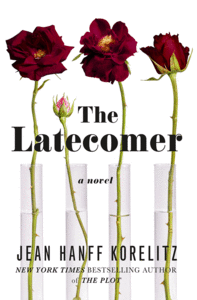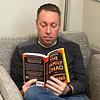Take a photo of a barcode or cover
Phoebe Oppenheimer arrived in the world seventeen years after her triplet siblings, but as she likes to point out, she’s exactly the same age. Sally, Harrison, Lewyn, and Phoebe started as four embryos in a petri dish, three implanted, and one sent off to be frozen and just about forgotten. The triplets don’t exactly create the loving, close family their mother Johanna envisioned, and it wouldn’t be an exaggeration to say that they can’t stand each other by the time they leave for college. In addition, their dad has checked out of their lives, supposedly (but only partially) due to his obsession with his art collection. Johanna, still hoping to create the blissful, loving family of her dreams, makes what feels like an impulsive decision, but actually did take quite a bit of planning. She hires a surrogate to carry the embryo that becomes Phoebe, the child nobody really wanted (including Johanna), but perhaps the one they all needed. Her wise and slightly cynical voice carries the novel from beginning to end, catching the reader up on all the many things she missed out on through her arrival seventeen years too late. She’s one of the few people you won’t want to strangle by the end of the book, but if you like messy family dynamics, then this one is a winner!
I was hopeful when I heard about this book and looking forward to reading it, but it was a bit of a letdown. I almost didn't finish reading it. It was very slow going for me and the story didn't seem to pick up as much as I was hoping it would.
This story is quite sad in parts and focuses a lot on the experiences of this family trying to live their life and then discovering as they've grown up that they've grown apart except then they realize they were never really that close, to begin with, it seems. The mother and father meet and marry in not the most ideal circumstances each with their own baggage that seems to permeate through everything It appears and then the mother is the one who wants children while it seems like the father isn't entirely sure but ends up going along with it. There is a bit discussed rather frankly about intimacy and infertility. They end up having triplets, but the 3 siblings are like strangers to each other as well as to the parents and the parents to each other. It's like all the family members are islands unto themselves floating apart and living life apart from each other even though they've grown up in the same house and whatnot. It was rather sad, strange, and a bit depressing as I read about their experiences and how they felt like strangers to each other. Toward the end of the book, things do change a bit for the better though with the coming of the last child into the family.
Reading this can be a bit hard or triggering in parts in regards to infertility or challenging family relationships, situations, and such. There is some wording and language used when discussing intimacy, infertility, and such that is a bit blunt or maybe a bit weird/off-putting for some as well.
Thanks to Celadon Books and NetGalley for letting me read and review this story. All thoughts and opinions are my own. #TheLatecomerBook #CeladonReads
This story is quite sad in parts and focuses a lot on the experiences of this family trying to live their life and then discovering as they've grown up that they've grown apart except then they realize they were never really that close, to begin with, it seems. The mother and father meet and marry in not the most ideal circumstances each with their own baggage that seems to permeate through everything It appears and then the mother is the one who wants children while it seems like the father isn't entirely sure but ends up going along with it. There is a bit discussed rather frankly about intimacy and infertility. They end up having triplets, but the 3 siblings are like strangers to each other as well as to the parents and the parents to each other. It's like all the family members are islands unto themselves floating apart and living life apart from each other even though they've grown up in the same house and whatnot. It was rather sad, strange, and a bit depressing as I read about their experiences and how they felt like strangers to each other. Toward the end of the book, things do change a bit for the better though with the coming of the last child into the family.
Reading this can be a bit hard or triggering in parts in regards to infertility or challenging family relationships, situations, and such. There is some wording and language used when discussing intimacy, infertility, and such that is a bit blunt or maybe a bit weird/off-putting for some as well.
Thanks to Celadon Books and NetGalley for letting me read and review this story. All thoughts and opinions are my own. #TheLatecomerBook #CeladonReads
'The Latecomer' is a beautiful, rough story of a family without family bonds, and the way they fall apart and fall back together. It's about art, IVF, Judiasm, politics, and why people make the devastating choices they do and how they impact others.
The first two sections of the book are about the parents and the triplets, and on these two sections alone, the book entirely absorbed me. But it really fell apart in the third section about the latecomer. It got too clean and took away the rawness that made it powerful to start with. But maybe that's because I prefer angst over happy endings, in literary fiction anyway.
For the first two sections, I loved how the writing mirrored the disconnection inside the family. You get just enough emotion to care for each character and understand them, but not enough to love them or support them. Everyone and no one is the bad guy.
I love how the narrator uses ‘our’ at very specific moments, which raises the possibilty of a joint narration that defies the basic premise. For me at least, the idea of who ‘we’ is changes throughout, from all three together, to just one of the triples, etc., and the timing of the reveal is perfect and unexpected (even if I don't like the decision itself). The narrator makes you feel just as much an outsider and insider as each family member appears.
4.5/5
The first two sections of the book are about the parents and the triplets, and on these two sections alone, the book entirely absorbed me. But it really fell apart in the third section about the latecomer. It got too clean and took away the rawness that made it powerful to start with. But maybe that's because I prefer angst over happy endings, in literary fiction anyway.
For the first two sections, I loved how the writing mirrored the disconnection inside the family. You get just enough emotion to care for each character and understand them, but not enough to love them or support them. Everyone and no one is the bad guy.
I love how the narrator uses ‘our’ at very specific moments, which raises the possibilty of a joint narration that defies the basic premise. For me at least, the idea of who ‘we’ is changes throughout, from all three together, to just one of the triples, etc., and the timing of the reveal is perfect and unexpected (even if I don't like the decision itself). The narrator makes you feel just as much an outsider and insider as each family member appears.
4.5/5
challenging
reflective
slow-paced
took me a while to get into this one but ended up really liking it!! The beginning is a bit tedious, as the writing is flowery and none of the characters are likable. When the drama started in the middle is when I became really interested and the last sibling's perspective was so enjoyable.
Dysfunctional uber wealthy family comes apart…the unraveling is entertaining and the wonder if they’ll be able to get it together…
emotional
funny
mysterious
reflective
slow-paced
Plot or Character Driven:
Character
Strong character development:
Yes
Loveable characters:
Complicated
Diverse cast of characters:
No
Flaws of characters a main focus:
Yes
4.5
In some ways, this is a pretty standard dysfunctional family story (which is fine, I LOVE these stories) -- the family here, the Oppenheimers, is a rich New York brood doing rich New Yorker things, like buying art and managing a hedge fund. Also, the father is kind of a tool and has an affair, and this affects all the children.
But this terrific novel also strikes out on its own and breaks many of the conventions of the traditional dysfunctional family story. The bulk of the story is about the kids: A set of triplets who all hate each other. It is fascinating to watch their dynamic play out here as we switch between their perspectives. Two of the three are sympathetic, root-able-for characters, and the third, like his father, is a tool. But they're all interesting, and do lots of interesting things.
Then of course, as per the title, there's a new sibling. The Latecomer. And that's when things start to get REALLY dramatic.
This is a novel that starts slowly and builds over time (this novel's a SHINING EXAMPLE of why you don't DNF after 50 pages
In some ways, this is a pretty standard dysfunctional family story (which is fine, I LOVE these stories) -- the family here, the Oppenheimers, is a rich New York brood doing rich New Yorker things, like buying art and managing a hedge fund. Also, the father is kind of a tool and has an affair, and this affects all the children.
But this terrific novel also strikes out on its own and breaks many of the conventions of the traditional dysfunctional family story. The bulk of the story is about the kids: A set of triplets who all hate each other. It is fascinating to watch their dynamic play out here as we switch between their perspectives. Two of the three are sympathetic, root-able-for characters, and the third, like his father, is a tool. But they're all interesting, and do lots of interesting things.
Then of course, as per the title, there's a new sibling. The Latecomer. And that's when things start to get REALLY dramatic.
This is a novel that starts slowly and builds over time (this novel's a SHINING EXAMPLE of why you don't DNF after 50 pages



